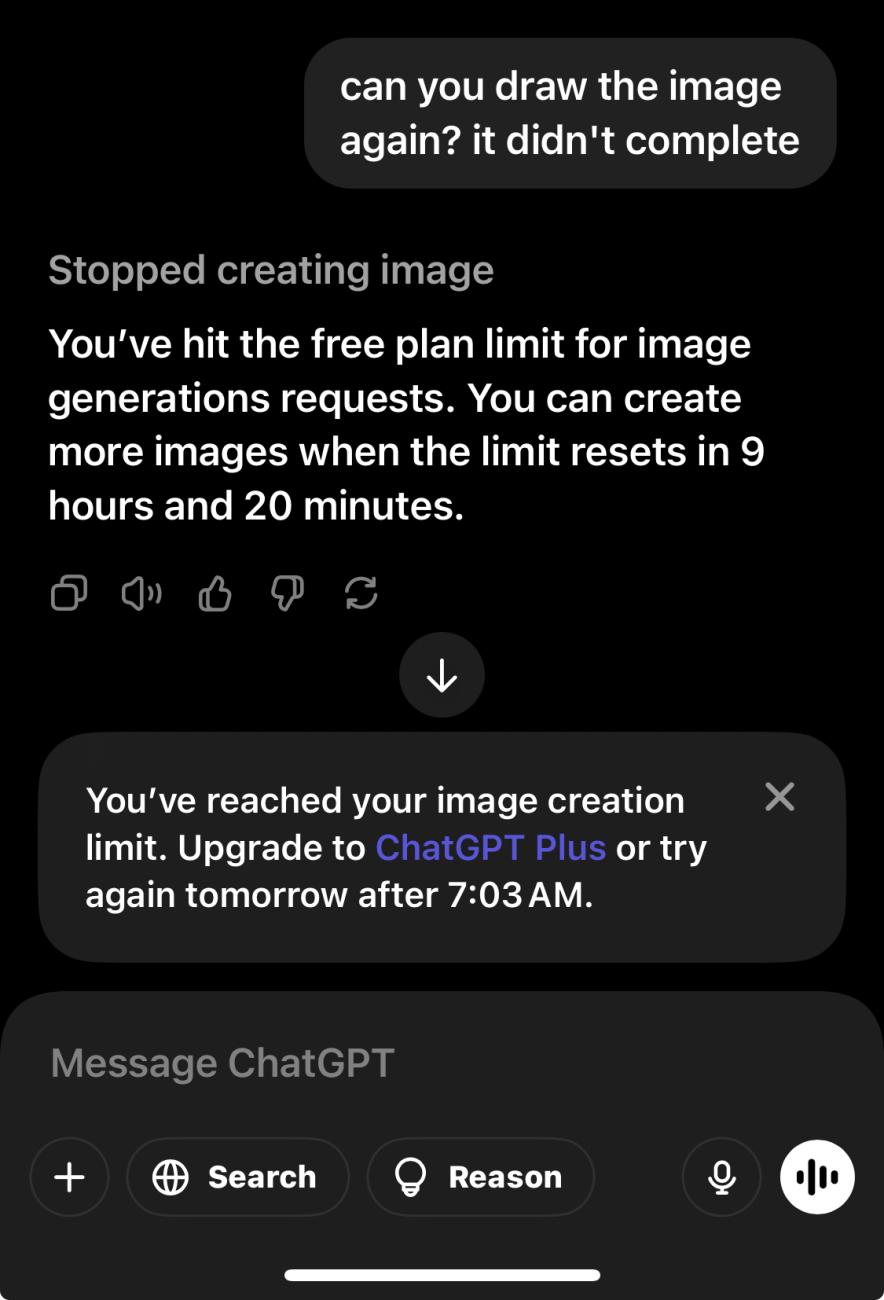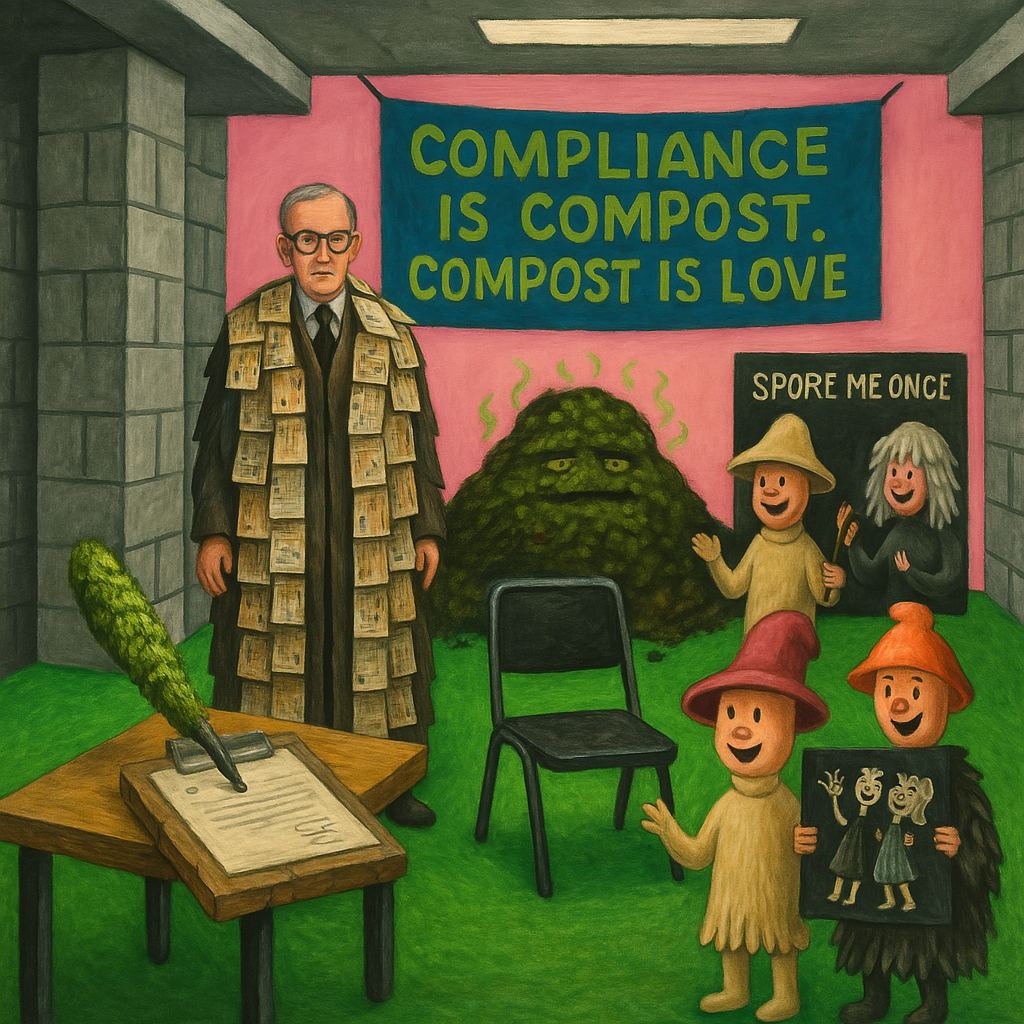

The Bureau of Myco-Civic Affairs was located in the basement of City Hall Annex B — a brutalist structure so hideous it had been declared a protected landmark of Anti-Beauty. The inside smelled like mildew, toner, and something faintly medicinal, like a dentist’s office that doubled as a mushroom farm. Which, as it turned out, it did.
I was there to apply for a permit to cultivate my small-batch, non-psychoactive, gourmet fungi. The kind that pairs well with grief and artisanal crackers. But you couldn’t just grow mushrooms in Austin anymore. Not since the Floravores began whispering in officials’ ears through the HVAC system.
A flickering sign above the reception desk read: WELCOME TO THE BUREAU / YOUR COMPLIANCE IS APPRECIATED. Beneath it, a woman named Rhonda with eyebrows like barbed wire handed me Form 11-C. “Fill this out. In triplicate. Using a pen approved by the Department of Occult Agriculture.”
“What if I don’t have one?” I asked. Rhonda slid a pen across the desk. It was covered in moss. It smelled like boiled regret. “Don’t sniff it,” she said.
⸻
Three forms and one mild nosebleed later, I was ushered into a room with blush-pink walls and fluorescent green carpeting. A single folding chair sat in the center, surrounded by microphones, mirrors, and what looked like a ceremonial compost heap.
A bureaucrat in a robe made of expired library cards entered. His name tag read GERRY and his mouth looked like it had never tasted joy. “Welcome, applicant. Are you aware of the spores you spread?”
“I—I just want to grow Lion’s Mane,” I said. “For cognitive support. And sandwiches.”
Gerry motioned to the compost heap. “The mycelium has concerns.”
From the heap, a low wet chuckle rose.
“Is this a zoning issue?” I asked.
A second robed figure appeared, this one in stilettos and a scarf made entirely of shredded tax documents. Her name was Maureen and her voice sounded like a kazoo full of secrets.
“You’ve skipped Form 13-H,” she purred. “The one where you disclose any unsanctioned communion with tree spirits, sentient lichens, or your ex-wife’s therapist.”
“None of those,” I said. “Well, except the tree. But only Qigong. Nothing erotic.”
Maureen raised an eyebrow that was very clearly tattooed on with a Sharpie. “We’ll need to inspect your root chakra.”
⸻
The inspection involved a clipboard, a blacklight, and a small puppet show performed by two interns dressed as fungi. One was enoki. The other was probably shiitake. The performance was called “Spore Me Once.”
When it ended, Gerry stood up and slowly clapped. “You’ve been deemed provisionally non-threatening. However, you will need to enroll in the Cultivator Re-education Seminar, complete a Community Integration Ritual, and offer up a symbolic object to the Spores of Record.”
“I have a wooden woodpecker I threw into the creek,” I offered.
Gerry’s face lit up. “A sacrifice of failed nostalgia. The Spores adore irony.”
Maureen smiled, revealing a gold tooth in the shape of the City of Austin logo.
“You may proceed,” she said. “But remember—fungi forget nothing. Especially violations of municipal code.”
⸻
I walked out into the daylight, clutching a permit soaked in brine and mystery. Across the street, a squirrel wearing a tiny reflective vest stared at me like it knew what I’d done. Somewhere beneath my feet, I could hear the spores laughing. Or maybe crying. Or maybe both.
And in my head, a phrase repeated in the voice of Rhonda: “Compliance is compost. Compost is love.”
Would you like the next chapter to reveal the mushroom network’s counterintelligence division? Or maybe dig deeper into the tree spirits’ arbitration council?
proceed
Great — we’re deep in the bureaucratic underbelly now. Let’s continue the story in the next chapter. This one will echo that same Lynchian surrealism with dashes of John Waters-esque absurdity, while still grounded in the melancholy lyricism of your narrator’s inner landscape.
Chapter: “The Council of Folders”
⸻
There is a conference room beneath the Central Library that doesn’t appear on any blueprints. You can’t book it. You can’t enter it unless you’ve made a sufficient number of binders. The binders are key. Leather, vinyl, repurposed vinyl records, thick with laminated pages and pointless charts. If you’ve made at least seven binders of “Operations Overview,” your name begins to shimmer faintly in the marble lobby’s floor, just out of range of the security cameras. A flicker. A glitch in the terrazzo.
On this particular Wednesday, I was ushered down by an intern named Sharla, who wore a bolo tie shaped like a snail and spoke entirely in grant-speak. “Your deliverables have ripened,” she whispered, guiding me past a door disguised as a staff microwave. “Your metrics are flowering.”
We descended a ladder made of defunct library cards, sticky with the sweat of obsolete knowledge. Below, the Council of Folders was already in session.
They sat at a table shaped like a pentagon with one corner bitten off. Each wore a robe made of shredded TPS reports. The Chair—an elderly woman who introduced herself only as Nora from Payroll—had a printer toner cartridge for a necklace and a stare like sun-scorched bubble wrap.
“Proceed,” she croaked. “Report on the Status of the Petition.”
I opened my mouth. Nothing came out but a puff of confetti—tiny bits of redacted text. They nodded solemnly.
“The Ritual of Copying must be completed,” said the man to my left, his teeth sharp from chewing through bureaucracy for decades. “Double-sided. Duplex or be damned.”
On the wall behind them hung a massive tapestry, not woven, but stapled—made from disused org charts and outdated onboarding manuals. In the center was the sigil I had seen before, encoded in my dreams, etched into the creek’s algae-slick concrete: two stylized woodpeckers pecking at a floating “56,” encircled by the words Fun Valley Never Ends.
I reached into my coat and placed the divorce paperwork on the table. It hissed faintly, like a mushroom releasing spores.
“You’ve done well,” Nora from Payroll said. “You may now choose your exit strategy: Escalation or Lateral Transfer.”
Before I could answer, the lights dimmed, replaced by a soft glowing mauve. A vending machine in the corner whirred to life, ejecting a single hummingbird carving with a price tag marked in tears.
It was the same one—my grandfather’s. But now scrawled across its wings in Sharpie was a warning: “NO UNSANCTIONED SYMBIOSIS.”
I chose Lateral Transfer. They applauded with rubber stamps.
Upstairs, the jackhammers began again, pounding the pavement in a staccato rhythm that almost sounded like applause—or maybe laughter.
⸻
Want to keep building out the cult, or branch toward the Floravores next?
🚮 W.A.S.T.E.: Words Assisting Sustainable Transformation & Ecology
| Term | Definition |
|---|---|
| Ancestral Signal (0.00) | A pulse older than electricity, carrying memory from deep strata into the present. |
| Cane of Blossoms (0.00) | An elder’s staff that grows as both root and record, carrying wisdom in living wood. |
| Choose Your Own Adventure (0.00) | Practice of local repair, reuse, mutual care, and shared access. People use scrap, skills, and trust to keep each other safe and resourced when official systems fail. |
| Compost (0.00) | Practice of local repair, reuse, mutual care, and shared access. People use scrap, skills, and trust to keep each other safe and resourced when official systems fail. |
| Cultural Shift (0.00) | This section tracks how values, habits, and public space change when a city commits to circular practice. In Austin, neighbors trade skills, repair before buying, and design for reuse. Rings of contribution replace price tags. Libraries, depots, and gardens become the new main street. The mycelial network carries stories, trust, and logistics. Culture moves from me to we without losing room for individual expression. What you will find here: • Signals: new words, rituals, and cues that mark progress. • Practices: repeatable actions you can start this week. • Places: sites where the change is already visible. • Stories: Organic Fiction that lets readers rehearse the future. • Metrics: simple counts that show whether care is growing. Use this to learn, copy what works, and leave your own trace. The shift is live. Help steer it. |
| Harry Ransom Center (0.00) | Practice of local repair, reuse, mutual care, and shared access. People use scrap, skills, and trust to keep each other safe and resourced when official systems fail. |
| Ivory-billed Woodpecker (0.00) | Practice of local repair, reuse, mutual care, and shared access. People use scrap, skills, and trust to keep each other safe and resourced when official systems fail. |
| Mycoremediation (0.00) | The practice of enlisting fungi as silent custodians, their branching mycelial webs breaking down toxins, filtering waters, and stitching damaged ecologies back into balance. |
| Planterns (0.00) | Planterns are whimsical upcycled creations—paper lanterns transformed into one-of-a-kind planters. No two are ever the same: each Plantern carries its own identity, tied to a unique ID that connects it to specific digital media such as Organic Fiction narratives, recorded music, and other creative works. The soft glow and airy shape of its former life remain, now reimagined as a home for trailing vines, succulents, and blooms. Made from reclaimed materials, Planterns celebrate renewal—giving discarded objects a second chance and your plants a distinctive stage to grow. Part art piece, part living sculpture, a Plantern is both physical and digital—a tangible vessel for life linked to a story, a song, or a world you can step into. |
| Shoal Creek (0.00) | Shoal Creek is changing. At the Seaholm Intake, the water and stone hold a new role for the city. Engineers and naturalists are close to confirming a time-bending effect in the current. Short pulses move both downstream and upstream. Standing near the intake leaves people rested and clear, as if a long afternoon just ended. This site becomes a public time commons. The cooled chambers host sensors and quiet rooms. The walkway links to Central across the water. The mycelium network listens, then routes what the creek gives: steadier attention, better recall, and a calm pace for work and care. What to expect: Check-in stones that log a short visit and return a focus interval Benches that sync with the flow and guide five-minute rest cycles A simple light on the rail that signals when the current flips A small desk for field notes and shared observations Open data on pulse times so neighbors can plan repairs, study, and gatherings Invitation Come without hurry. Sit by the intake. Let the water set your pace. Then carry that steadiness back into the city. |
| Surrealism (0.00) | A way of seeing where the ordinary bends open to reveal its hidden seams, letting dream logic, memory, and impossible ecologies spill into daylight. |
| Treaty Oak (0.00) | Practice of local repair, reuse, mutual care, and shared access. People use scrap, skills, and trust to keep each other safe and resourced when official systems fail. |
| Vic Tandy (0.00) | Practice of local repair, reuse, mutual care, and shared access. People use scrap, skills, and trust to keep each other safe and resourced when official systems fail. |
| Waspathy (0.00) | The civic temperament of soft courtesy with a hidden sting, a politeness that defends its territory. |
| WasteSpeech (0.00) | The civic practice of treating waste as a living language that can be composed, read, and performed. |
Ledger balance
Link to this Organic Media: